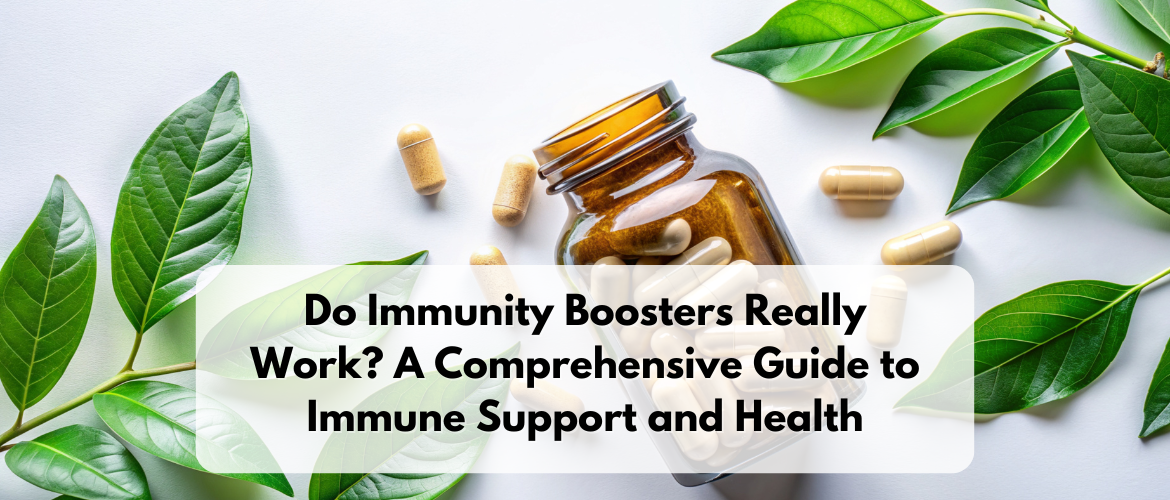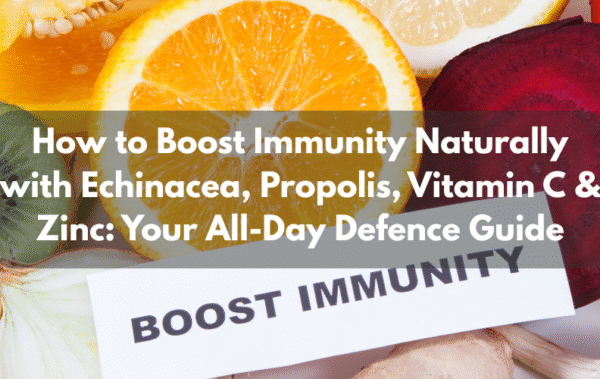No products in the cart.
Do Immunity Boosters Really Work? A Comprehensive Guide to Immune Support and Health

The pursuit of better health often leads people to seek solutions that promise to strengthen their immune system. Among these, immunity boosters have garnered significant attention, especially in recent years. From vitamin-packed supplements and herbal remedies to nutrient-rich drinks, claims about enhancing immune strength abound. But can these products truly make a difference? Are immunity boosters scientifically proven to support your body’s defenses, or are they more marketing hype than substance?
This guide provides an in-depth analysis of immunity boosters, explains how the immune system works, and explores the most effective ways to support immune health. Whether you’re preparing for flu season, recovering from illness, or simply aiming for overall wellness, this blog equips you with knowledge to make informed decisions.
What Are Immunity Boosters?
Immunity boosters refer to products, foods, or nutrients that claim to enhance the immune system’s function, enabling the body to better fight infections and illnesses. These boosters come in various forms, such as:
- Vitamins and minerals: Including Vitamin C, Vitamin D, and Zinc, known for their immune-supporting properties.
- Herbal supplements: Such as echinacea, elderberry, turmeric, and ginger.
- Probiotics: Beneficial bacteria that support gut health, which is closely linked to immune health.
- Functional foods: Superfoods like citrus fruits, garlic, and green tea.
While many of these ingredients have scientific backing, their efficacy depends on factors such as individual health status, proper dosage, and consistency of use.
How Does the Immune System Work?
The immune system is a complex network of cells, tissues, and organs working together to protect the body from harmful invaders like bacteria, viruses, fungi, and toxins. It operates through two primary mechanisms:
1. Innate Immunity
This is the body’s first line of defense, consisting of physical barriers like skin and mucous membranes, as well as immune cells that provide immediate responses to pathogens.
2. Adaptive Immunity
This is a more targeted defense system, where the body develops antibodies to fight specific pathogens it has encountered before. Adaptive immunity enables the immune system to “remember” past invaders and respond more efficiently in the future.
A strong immune system relies on balanced nutrition, regular physical activity, adequate sleep, and effective stress management. Boosting these foundations can amplify your body’s natural defenses.
Do Immunity Boosters Really Work?
The efficacy of immunity boosters depends largely on their ingredients and how well they complement your overall health. Let’s take a closer look at some common boosters and their impact:
Vitamin C: The Antioxidant Powerhouse
- Benefits: Vitamin C is a potent antioxidant that supports the production of white blood cells, which are essential for fighting infections. It also helps reduce oxidative stress, which can weaken the immune system.
- Evidence: Clinical studies show that Vitamin C can shorten the duration of colds and reduce their severity, though it doesn’t necessarily prevent illness.
- Sources: Citrus fruits, strawberries, bell peppers, broccoli, and spinach.
Vitamin D: The Immune Modulator
- Benefits: Vitamin D activates T-cells, which are critical for identifying and attacking harmful pathogens. It also helps regulate inflammation.
- Evidence: Research indicates that individuals with low Vitamin D levels are more susceptible to respiratory infections and illnesses.
- Sources: Sunlight, fortified milk, fatty fish (salmon, mackerel), and egg yolks.
Zinc: The Infection Fighter
- Benefits: Zinc supports the development and activation of immune cells and helps reduce inflammation. It’s particularly effective for combating colds and promoting wound healing.
- Evidence: Studies show zinc can reduce the duration of cold symptoms and enhance immune response.
- Sources: Shellfish, pumpkin seeds, chickpeas, red meat, and nuts.
Probiotics: Gut Health Equals Immune Health
- Benefits: Probiotics support a balanced gut microbiome, which plays a critical role in immune function. A healthy gut reduces inflammation and enhances overall immunity.
- Evidence: Certain probiotic strains have been shown to prevent respiratory infections and boost immune cell activity.
- Sources: Yogurt, kefir, kombucha, sauerkraut, and other fermented foods.
Elderberry: The Herbal Ally
- Benefits: Elderberry is rich in antioxidants and bioflavonoids that may help reduce symptoms of colds and flu by boosting cytokine production.
- Evidence: Some studies suggest elderberry can reduce the severity of viral infections, though more research is needed.
- Sources: Elderberry syrups, capsules, and teas.
Limitations of Immunity Boosters
While immune support supplements can complement a healthy lifestyle, they are not miracle cures. Here are a few limitations to keep in mind:
- No Instant Results: Immune health is built over time. Taking a supplement during an illness won’t provide immediate relief.
- Not a Cure-All: Boosters can address nutrient gaps but cannot replace foundational habits like balanced nutrition, sleep, and exercise.
- Risks of Overuse: Excessive intake of certain nutrients, such as Vitamin A or Zinc, can lead to toxicity and adverse effects.
Natural Ways to Support Immune Health
For long-term immune strength, prioritize these proven practices:
1. Eat a Nutrient-Dense Diet
Focus on whole foods like fruits, vegetables, lean proteins, whole grains, and healthy fats. Foods rich in Vitamin C, Vitamin D, Zinc, and antioxidants should be staples in your diet.
2. Exercise Regularly
Moderate physical activity enhances circulation, reduces inflammation, and supports the production of immune cells.
3. Prioritize Sleep
Quality sleep allows the immune system to regenerate and repair itself. Aim for 7-9 hours of sleep per night.
4. Manage Stress
Chronic stress suppresses immune function. Incorporate stress-relieving practices like meditation, yoga, or deep breathing exercises into your routine.
5. Stay Hydrated
Proper hydration supports lymphatic function, which is essential for transporting immune cells throughout the body.
When to Consider Supplements
If you struggle to meet your daily nutritional needs or have specific deficiencies, immune health supplements can provide targeted support. Look for high-quality products with ingredients like Vitamin C, Vitamin D, Zinc, and probiotics. Always consult your healthcare provider before starting any new supplement regimen.
Final Thoughts: Do Immunity Boosters Work?
The short answer is yes, but they work best as part of a holistic approach to health. Scientifically proven immunity boosters like Vitamin C, Vitamin D, Zinc, and probiotics can complement a healthy lifestyle and address specific nutritional gaps. However, supplements are not a substitute for balanced nutrition, regular exercise, proper sleep, and effective stress management.
For sustainable immune support, focus on building healthy habits and use supplements as tools to enhance—not replace—your body’s natural defenses. By understanding the science behind immunity boosters and making informed choices, you can empower yourself to maintain optimal health year-round.
Start your wellness journey today — Visit Unike Nutra Now
Follow us
Facebook – https://www.facebook.com/profile.php?id=61567462823245
Instagram – https://www.instagram.com/unikenutra/
Twitter – https://x.com/Unikenutra
LinkedIn: https://www.linkedin.com/company/unike-nutra/
Amazon: https://www.amazon.com/stores/UnikeNutra/
Buy Now:






